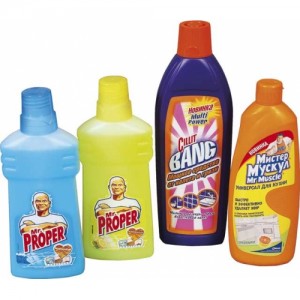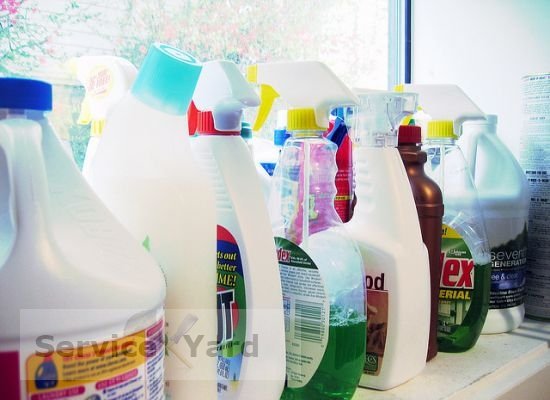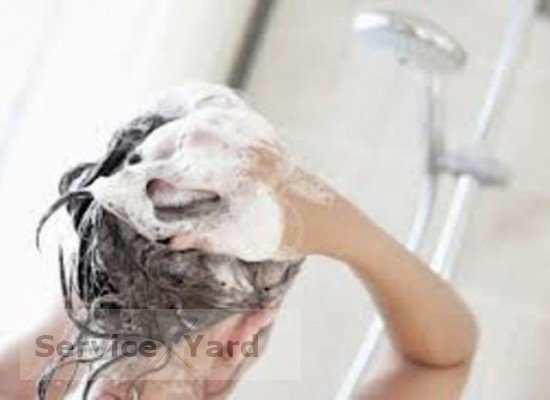Detergent Harm

Many people know about the harm of detergents that are presented in stores. The fact that they are made of synthetic components is alarming. Each component of household chemicals carries a certain share of risk to human health. How to protect yourself and your family? What components are often included in detergents and how are they dangerous to humans? We will answer these questions in this article.
to contents ↑What components are modern detergents made of?
 To imagine the whole picture of how such detergents can threaten health, you need to familiarize yourself with their composition. All incoming elements are designed to remove pollution of various origins: fat, scale, tea and coffee. Often they are toxic and, accordingly, harmful.
To imagine the whole picture of how such detergents can threaten health, you need to familiarize yourself with their composition. All incoming elements are designed to remove pollution of various origins: fat, scale, tea and coffee. Often they are toxic and, accordingly, harmful.
The composition of all household cleaning products includes:
- Surfactant;
- Alkalis - salts of various types;
- Bleach;
- Complexing elements;
- Chlorine;
- Perfumes;
- Enzymes
- Hydrotopes.
to contents ↑Important! What harm does each of these components of detergents do to a person, see below. Determining which harmful detergents you use is easy. Just carefully read the composition of a particular concentrate or powder and make sure that toxic components are present in a dose that is acceptable by current standards.
Surfactant
Surfactants form the basis of any detergent product. It is they that allow using one drop of the agent to wash the fat of any age. All surfactants are divided into anionic, cationic and nonionic. Anionic surfactants are considered the most dangerous.
The harm they cause to humans:
- Once in the body, they settle on the cell membrane and, in a certain amount, are capable of causing malfunctions in biochemical processes inside the cell. They provoke a violation of the integrity and functionality of the cell.
- Negatively affect the immune system, especially anionic surfactants.
- They cause damage to the skin.
- They cause disturbances in the functioning of the liver, gastrointestinal tract and pancreas.
Salts of weak inorganic acids
These include: sodium carbonate, sodium silicates and sodium bicarbonate. These substances break down proteins and polysaccharides. Saponify fats and oils. They work as corrosion inhibitors.
Detergent damage with these components:
- negatively affect the genitourinary system;
- cause malfunctions of the digestive system.
Neutral salts
These include chlorides and sulfates. The main task is to thicken the detergent to reduce consumption.
The harm of neutral salts is that they cause:
- irritation of the mucous membrane of the eyes;
- headache;
- nausea
Complexing elements
These include: zeolites, sodium polyphosphates, sodium citrate, sodium tripolyphosphate. These substances bind hardness ions, preventing the deposition of salts on the surface of dishes and dishwashers.
Damage to detergents in which the rate of these substances is too high:
- in large quantities causes liver disease;
- negatively affects the work of the spleen.
Bleaching reagents
 These substances have a disinfecting and whitening effect. They remove the most serious pollution: traces of dyeing products, tea, coffee and juices.
These substances have a disinfecting and whitening effect. They remove the most serious pollution: traces of dyeing products, tea, coffee and juices.
Harm:
- damage the skin of the hands;
- cause asthma and chronic bronchitis.
Perfumes
Caustic chemicals that are designed to maintain a pleasant aroma during washing.
Harm:
- it is difficult to wash off from the surface, therefore it easily enters the human body, causing gastrointestinal problems;
- cause allergies;
- especially dangerous for children.
Hydrotropes, enzymes, chlorine
Hydrotopes include lower alcohols and urea. They are needed for the rapid dissolution of surfactants in water.
Enzymes are proteases, lipases, and amylases. Insoluble protein compounds are removed.
Chlorine is a disinfectant. Removes most known microorganisms and bacteria.
Damage to detergents, which contain these elements:
- problems with the respiratory system;
- negative effect on the mucous membrane of the eye;
- with a large dose - severe poisoning.
Important! According to statistics: every year one person eats 0.5 l of detergent. Each plate must be thoroughly washed under running clean water up to 10-15 times. But who does this?
If you care about your health and the well-being of your family, refuse to use such detergents. When, for whatever reason, you cannot do this, then stick to our tips for using household chemicals. This to some extent neutralizes its negative impact.
to contents ↑Useful Tips:
- Use the product only in case of especially serious contamination.
- Do not mix cuts of several detergents.
- Work in rubber gloves.
- Take a minimum of the substance at a time.
- Never use a substance with a pronounced aroma.
- Rinse the dishes well several times with clean water.
- Try not to inhale the vapors.
Stock footage
Now you know what kind of harm detergents do, which we used to use every day to quickly solve all sorts of household chores. To apply them further, after receiving this information, or to refuse in favor of the people, safer, but slowly acting - it's up to you. We hope you find any solution easy!
- How to choose a vacuum cleaner taking into account the characteristics of the house and coatings?
- What to look for when choosing a water delivery
- How to quickly create comfort at home - tips for housewives
- How to choose the perfect TV - useful tips
- What to look for when choosing blinds
- What should be running shoes?
- What useful things can you buy in a hardware store
- Iphone 11 pro max review
- Than iPhone is better than Android smartphones



